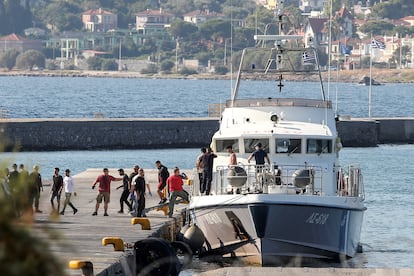Four children dead in two migrant boat sinkings off Greek islands near Turkish coast
A government spokesperson said the children were: an 8-year-old boy and three girls aged 14, 8 and 11 months. A woman also died, and 18 people were rescued

Five people, including four children, died and dozens were rescued Monday in two separate incidents involving migrant boats heading to Greek islands from nearby Turkish shores, Greek authorities said.
The coast guard said four people died and 18 were rescued after a boat carrying migrants apparently sank northeast of the Greek island of Lesbos, which is near the Turkish coast. Government spokesperson Pavlos Marinakis said all four were children: an 8-year-old boy and three girls aged 14, 8 and 11 months.
Greece’s minister for merchant marine, Miltiadis Varvitsiotis, said the coast guard carried out the rescue inside Turkish waters. Coast guard spokesperson Nikos Alexiou said the Turkish coast guard did not conduct a rescue operation, so a Greek patrol boat recovered the passengers.
The survivors were taken to Lesbos’ main port of Mytilene, where two people were transferred to a local hospital.
Earlier Monday at about 1 a.m., a coast guard patrol boat spotted a dinghy carrying 37 people off the eastern Aegean island of Samos, the coast guard said. It said the passengers fell into the water upon seeing the patrol boat, triggering a rescue operation.
A woman and a young boy were pulled from the water unconscious and coast guard officers tried to resuscitate them, authorities said. The woman died but the boy survived and was transferred to a hospital on Samos along with nine other survivors, the coast guard said.
“We express our deepest sadness” for the five deaths, Marinakis said at a regular briefing. He praised the coast guard for “superhuman efforts” to rescue lives at sea. “It is imperative that the dismal smuggling networks that exploit vulnerable people are struck at their roots,” he said.
Over the weekend, the coast guard said it picked up dozens of people from boats near islands in the eastern Aegean Sea, part of an increase in new arrivals over the past two months.
It said it recovered 20 people from a dinghy off the coast of Lesbos on Sunday, and 11 others from another dinghy that was sinking near the same island on Saturday.
Two other boats arrived on Samos on Saturday, the coast guard said, one carrying 35 people and one with 21 people.
For decades, Greece has been a preferred entry point into the European Union for people fleeing conflict or poverty in the Middle East, Africa and Asia and hoping for a better life in Europe.
More than 14,000 people have reached Greece by land and sea so far this year, according to United Nations figures. That’s about a tenth of the total successful Mediterranean crossings, most of which — about 104,000 — were to Italy. Arrivals in Greece for the whole of 2022 totaled 19,000.
In June, a battered fishing trawler heading from Libya to Italy with an estimated 500-750 people on board sank in international waters off southwestern Greece. Only 104 survivors were found, and Greek authorities were heavily criticized for failing to evacuate the vessel in time.
The government has attributed the rise in migrant crossings since then to better summer weather and smugglers taking advantage of an increase in Aegean small boat traffic during the tourist season.
After nearly a million people entered Greece at the height of Europe’s 2015 migration crisis, the vast majority hoping to move north to wealthier European countries, Greece increased patrols along the sea and land border with Turkey to halt arrivals.
Human rights groups and migrants denounced the government for carrying out summary deportations of people arriving in the country without allowing them to apply for asylum, an accusation the government strongly denied.
Sign up for our weekly newsletter to get more English-language news coverage from EL PAÍS USA Edition
Tu suscripción se está usando en otro dispositivo
¿Quieres añadir otro usuario a tu suscripción?
Si continúas leyendo en este dispositivo, no se podrá leer en el otro.
FlechaTu suscripción se está usando en otro dispositivo y solo puedes acceder a EL PAÍS desde un dispositivo a la vez.
Si quieres compartir tu cuenta, cambia tu suscripción a la modalidad Premium, así podrás añadir otro usuario. Cada uno accederá con su propia cuenta de email, lo que os permitirá personalizar vuestra experiencia en EL PAÍS.
¿Tienes una suscripción de empresa? Accede aquí para contratar más cuentas.
En el caso de no saber quién está usando tu cuenta, te recomendamos cambiar tu contraseña aquí.
Si decides continuar compartiendo tu cuenta, este mensaje se mostrará en tu dispositivo y en el de la otra persona que está usando tu cuenta de forma indefinida, afectando a tu experiencia de lectura. Puedes consultar aquí los términos y condiciones de la suscripción digital.








































